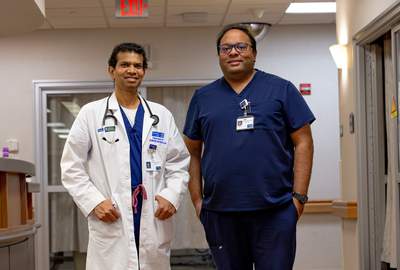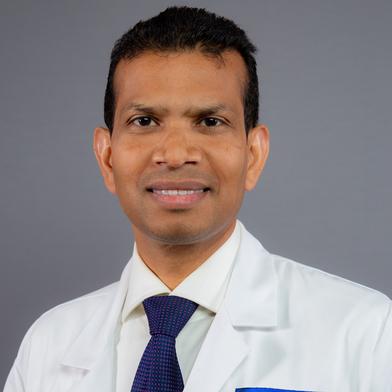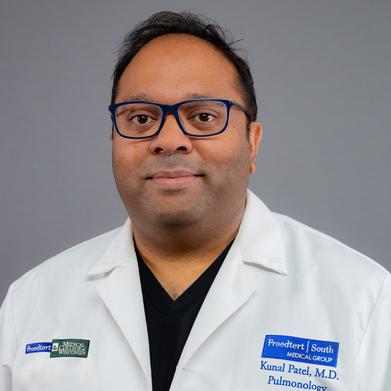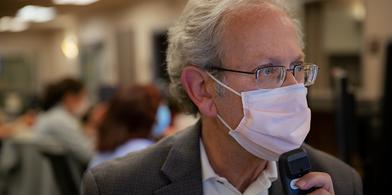Critical Care has changed a lot in the past decade. The Intensive Care Unit (ICU) provides care for severely injured or ill patients who require constant observation and whose conditions can rapidly become unstable. Intensivists are medical practitioners who specialize in caring for this complex type of critically ill patient. Advancements to this field call for Intensivists to manage ICUs, citing prompter care, improved recovery outcomes, and reduced length of hospital stays. With the help of new Intensivists, Dr. Srikanth Davuluri and Dr. Kunal Patel, Froedtert Pleasant Prairie Hospital ICU can provide the leading-edge treatment that is typically only found in very large university hospital settings.
Let’s learn more about what all this excitement means for the community by getting to know Dr. Davuluri and Dr. Patel!

DR. DAVULURI
WHAT IS SO EXCITING ABOUT FROEDTERT PLEASANT PRAIRIE HOSPITAL ADDING INTENSIVISTS TO THE TEAM?
DR. DAVULURI: An increasing number of surgeries are being performed here at Froedtert Pleasant Prairie Hospital, which means more care is needed to manage patients post-surgery in the ICU. The role of Intensivists in the ICU is to manage the complexities of critical patient care, foster interdisciplinary collaboration, and ease the role of the surgeon and primary care provider. This Intensivist model is such an enormous leap forward in patient care at Froedtert Pleasant Prairie Hospital. I am excited to be bringing this advanced care to patients here with the incredible support of Froedtert Pleasant Prairie Hospital and the teamwork of Dr. Patel.
DR. PATEL: In the ICU, we are typically dealing with patients with life-threatening diseases, major heart attacks or strokes, severe infections, such as sepsis, and more. As Intensivists, we are specialists for the ICU. We help support the whole medical team while being focused on the patient. For example, after a cardiac or neurosurgery, the Intensivist plays a key role in managing the patient’s recovery in the ICU while collaborating with the surgeons, cardiologists or other specialists involved. I describe the Intensivist role as an ER doctor for people already in the hospital. It is a critical role that Dr. Davuluri and I are excited to be in.
WHAT IS THE IMPORTANCE OF PULMONOLOGY?
DR. DAVULURI: Pulmonology deals with diseases affecting the respiratory tract, especially the lungs. Pulmonologists specialize in the mechanics of breathing and breathing patterns. Since breathing is essential for life, pulmonology really goes hand in hand with critical care. We also manage patient ventilators in the ICU.
DR. PATEL: In Pulmonology, we deal with lung function and other respiratory conditions such as asthmas, COPD, sleep apnea, and lung cancers. Difficulty breathing impacts everything about a patient’s quality of life. Pulmonology is linked with critical care because challenging respiratory illnesses need intensive support. The heart and lungs are closely linked together, so pulmonology is closely connected to cardiac health. With infections, stroke, and other diseases, lungs and breathing can be intensely impacted. Pulmonologists are in close collaboration with cardiologists, nephrologists, and neurologists to provide optimal patient care.

DR. PATEL
WHAT INSPIRES YOU TO DO YOUR WORK AS A PULMONOLOGIST AND INTENSIVIST?
DR. DAVULURI: I have always been interested in biology and using it to help people. Medicine is a beautiful way to help people, and I view helping others as a great privilege. I always wanted to be a critical care doctor because it puts me in an environment where I see the entire physiology every day. Plus, I love the tech! When robotic technology entered the field, I quickly learned those skills. I grew my pulmonary practice with robotics, and I utilize minimally invasive robotic technology to diagnose extremely early-stage cancers so small that we previously could not physically reach them. Embracing these technological advancements has allowed me to merge my loves for tech and science to help people.
DR. PATEL: This work inspires me because every case provides a challenge. The Intensivist side is inpatient in the ICU while the Pulmonologist side is both inpatient in the ICU and outpatient in the clinic. The variety maximizes my skills, and I enjoy needing to keep up with all aspects of medicine. I get to see patients dangerously close to death make recoveries. I witness them at their worst in the ICU and then see them at their best at follow-up appointments. I enjoy providing longer care for patients over time and building relationships. My patients become a kind of extended family for me, and I love utilizing all my skills to help them.
HOW DO YOUR SPECIALTY SKILLS HELP LOCAL PATIENTS?
DR. DAVULURI: With over fifteen years of experience in my field, I excel in the critical care environment and can get to the root cause of problems quickly. I really listen to my patients to understand all their concerns. In turn, I take time explaining in basic terms so that they understand me and understand the decisions they are making about their medical care. In Pulmonology, there are advanced treatments and technologies that I am trained in, such as robotics. My goal is to help patients in every stage of their disease, and I do not want patients to feel like they are alone in their struggles. We are here to help, and we make getting that help very accessible here at Froedtert Pleasant Prairie Hospital. Something else very important for my medical practice, and of great benefit to my patients, is that I am Board Certified in Sleep Medicine. Sleep is as essential as oxygen or food. Lack of sleep eventually surfaces in the body as inflammation, heart disease, hypertension or other mental or physical health problems. Sleep is such an important item to address, and I can help my patients find the right treatment method.
DR. PATEL: I focus on patient connections. I spend time explaining, in common language, their limitations and options, and we make decisions together. I always want patients to fully understand what is going on with their medical situation. I live in Pleasant Prairie, and this friendly community reminds me of where I grew up in Mississippi. I enjoy playing tennis, restoring cars, and collecting vinyl records. Being part of this community matters to me, and I enjoy getting to know my patients. Scheduling with me is simple, and patients can get in promptly. Realtime communication with patients is a priority for me, and I utilize MyChart and phone calls for convenient communication.
WHY HAVE YOU CHOSEN TO WORK AT FROEDTERT PLEASANT PRAIRIE HOSPITAL?
DR. DAVULURI: I chose to work at Froedtert Pleasant Prairie Hospital because this is my hospital of choice for my own healthcare needs, too. I live nearby with my wife and two daughters. The convenience and quality of services here at Froedtert Pleasant Prairie Hospital matter to me and my family, and I am proud to be part of providing services here. Healthcare is a pillar of the community, and Froedtert Pleasant Prairie Hospital is dedicated to strengthening that pillar. Lung cancer screening and our advanced emphysema program are just two of the many unique ways we are improving community health. I love being part of this unique community hospital that houses leading edge specialties and technologies.
DR. PATEL: Dr. Davuluri and I have worked together in the past, and it was our goal to work together again and foster an environment of multidisciplinary collaboration while bringing advanced pulmonary testing and treatments to the community. It’s important to me that Froedtert Pleasant Prairie Hospital is a state-of-the-art one-stop shop. We get to collaborate with surgeons here and, for the most part, do not have to transfer patients to other surgical facilities. Being able to accomplish so much on-site improves scheduling, logistics, and overall patient care. I am proud to be part of caring for patients here at Froedtert Pleasant Prairie Hospital.



